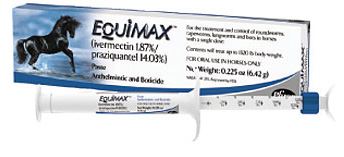The science behind deworming horses has come a long way, but educating equine owners still has a ways to go.
Sarah E. Coleman

While some of us are old enough to remember when the veterinarian came to the barn twice a year to “tube worm” the horses (literally, putting a tube into the horse’s stomach and administering the deworming medication), many horse owners have jumped on the fecal test bandwagon to ensure their horses stay healthy—but not nearly enough owners are utilizing this great tool.
Here is a quick refresher on how the world of deworming has changed.
An Easy Test

Gone are the days of dosing your horse according to the calendar. Now, many people pull fecals on their horses before making a decision as to what (if any) deworming medication their horse may need. Here in the Bluegrass, we’re very lucky to have multiple wonderful equine clinics right at our doorstep; in other areas of the county, fecal samples have to be mailed out to be tested.
Getting a fecal sample from your horse may be the easiest, least-invasive test you ever do on him. Breaking the seal on a fecal cup, dumping in one fresh pile of poo and sending it off to the lab (either dropping it off yourself or sending it with the vet) is super simple. But it’s not a one-and-done exercise.
In many cases, more than one sample is needed. Often if the test indicates that your horse does have worms, you’ll need to pull a fecal after treating him with deworming medication to be sure that he has decreased his worm load.
Do I REALLY Need to Have a Fecal Egg Count Done?
While a fecal sample is not required to buy a tube of dewormer, it cannot be recommended strongly enough. Though your horse may look fantastic with old-school rotational dewormer use, there is no guarantee without a fecal that he is not still carrying a significant worm load. Studies have shown that between 20 and 30 percent of the horses carry 70 to 80 percent of the worms.
In addition, fecal tests will tell you not only if your horse is carrying a heavy worm load, but if he is a low, medium or high shedder of worm eggs, which would greatly affect other horses turned out in his field.
Similar to antibiotics in humans, many deworming medications are becoming ineffective because of the worm’s resistance to the drugs. Because of this, you’ll need to target the specific worms your horse carries to have an effective deworming protocol. It is also important to know just how many worms your horse is carrying, not just what kind. Fecal tests primarily target strongyle and ascarid eggs. Once you know what kind of worms your horse has, and how heavily infested he is, you can create a plan of action.
Testing for Tapes?
It’s important to note that most labs that perform fecal samples do not test for tape worms unless specifically asked to do so. Testing can determine if tape worms are present, but they cannot determine how heavily infested your horse may be.
The reason a fecal test cannot detect tape worms well is that tapeworm eggs are not released in the same manner as from roundworms. Tapeworms don’t shed eggs regularly, which means they might not even show up in the fecal sample you sent to the lab, but your horse may still be infested with tapeworms.


Because of this, it is recommended that you administer dewormer specifically designed to combat tape worms every 6 to 12 months (on the recommendation of your veterinarian). Dewormers that specifically target tapeworms are praziquantel (which are found in paste combos with ivermectin or moxidectin) or a double dose of a pyrantel pamoate paste.
